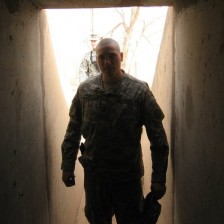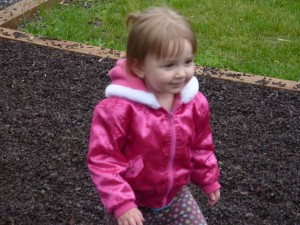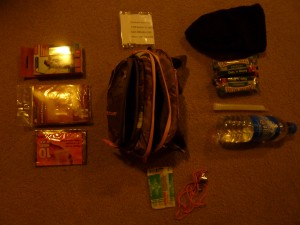Just so you know, that picture is one of my oldest daughter about three years ago, and thank fully she has never been lost. But we plan for the worst and hope for the best.
Some great info for you guys tonight that I pulled largely from a phenomenal book titled The Survivors Club by Ben Sherwood. Having small children myself the fear of them getting lost while in the woods is a real fear. I never appreciated how much you care for children until you have your own and sometimes you want to protect them from the world itself. While picking berries in the woods in my youth I remember having a searcher stumble upon me when I was out of site from my parents me; asking me if I was another kid. I looked at him quizzically and said nope. He asked if I was lost; I replied that I was picking berries and my family was just out of sight. Why? I had asked. It turned out a teenager had gotten lost in that general vicinity and I let him know I hadn’t seen anyone. They found the kid that evening tired and bruised but none the worse for wear. The kid had realized he was lost and was an urbanite unfamiliar with the woods; he had turned in one direction and ran as fast as he could until exhaustion found him. Surprising to me was the fact that he had in fact run up hill and further into the woods when downhill would have, as it generally does, led him to a highway and civilization.
In the book the author interviewed a child psychologist who had worked in that field for years prior to the incident that changed his life. In 1986 he was brought in to help find a 9 year old boy lost in Nova Scotia. The child had been missing for several days and an army of searchers had failed to find the child. They hope that this doctor could tell them something that could lead them in the direction of the boy. He was brought in where he looked at a topographical map, and realized that he had no clue about how a child would react under those circumstances. He resigned himself to the position of one more additional searcher in a rescue turned tragic when they finally found the boy’s body; less than two miles from his aunt and uncle’s house. The search had lasted over 165 hours.
Shocked that he could do nothing with his years of experience he led an effort to research this area and help searchers find children. He realized there had to be trends and spent the next several years pouring over searches, both successful and tragic. Here are some trends that he identified. “All you need to know about lost people is their age and their outdoor activity and you can calculate how far they’re likely to travel and where you should go looking.”
“It is more important to realize that a known percentage of all lost person is found within a one- or two-mile radius than it is to know how they got there.”
“Hunters get lost most often. Typically, when they’re found, they’ve traveled between 0.94 and 2.25 miles. They’re also easy to find in a search. They’re good communicators and they typically have solid outdoor skills. Hikers are another big group that gets lost. They’re very dependent on trails and most often don’t have maps or compasses. When they’re found, they’ve typically traveled between 0.87 and 2.88 miles.”
“Small children between ages one and six usually travel between 0.67 and 1.65 miles. The smallest ones, between one and three, have no idea they’re lost. If they’re separated from their parents, that have no ability to find their way; they wander aimlessly, and they typically don’t go very far. They’re usually found sleeping.”
“Three- to six-year-olds are more mobile, and they understand the idea of getting lost. They tend to take care of themselves better than older children and even adults. They burrow in bad weather by sleeping in caves or hollows. Typically, they’re stranger resistant, meaning they won’t respond to searchers.”
“Older children between ages seven and twelve will run when they’re lost. The distance is usually between 0.92 and 1.70 miles. They’re often afraid of punishment, and they won’t answer searchers until they’re cold and hungry.”
My buddy Sean was up cutting wood when he lost track of his teenage son. He started shouting and found no response. He searched the area and then ran back down to where his truck was parked to make some calls on is phone. Sitting in the cab of the truck was his son. He had taken an alternate route back to the truck to do some exploring. He had heard his dad yelling but thought he was in trouble and had kept silent.
What have you done to prepare for the trip to the woods? Have you told someone where you are going? Do they know when to expect you back?
Hill’s number one survivor tip is to “stay where you are or find an open place nearby. We always find clues before we find the victim. What does this tell you? The point is that if the victims had stayed in one place, they would probably have been found sooner.”
If there are two things I’ve tried to instill into the minds of my daughters it is that if they ever don’t know where they are they should stay in that place and not move; mommy and daddy will find them. The second is that they should always respond to someone calling their name; if they’ve been lost or missing they will never be in trouble. If they fallow these two rules their chances of a happy rescue grow exponentially.
Since the early nineties “children throughout the province are taught ‘woodsproofing,’ and hunting licenses now require a working knowledge of navigation with a compass.
I’ve attached a picture of the day packs I’ve prepared and gone over with my daughters for when we are out and about. I’ve also taken the time to make sure they know how everything works. The kits are not heavy or overly complex, but they have what I feel would give them the best odds of rescue and survival.
Here’s what you are seeing in the picture:
- I pink trimmed bag that my girls picked out (both bags are identical).
- Band-Aids because they comfort my girls, even with minor scratches.
- An emergency whistle.
- Small water bottle.
- Unwrapped chem stick (it doesn’t require batteries and will last for hours).
- Trail bars.
- Fleece bennie.
- Pocket warmers.
- Rain Poncho.
- Emergency space blanket.
- And a zip lock bag with the names of the child’s parents, address, and phone numbers.
This may be over excessive, but everything is compact and light weight. If you have things you’ve done to help prep your children please share.
Jon



Leave a Reply